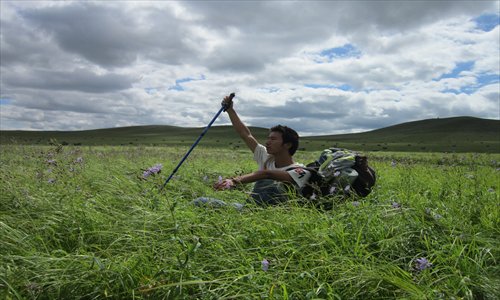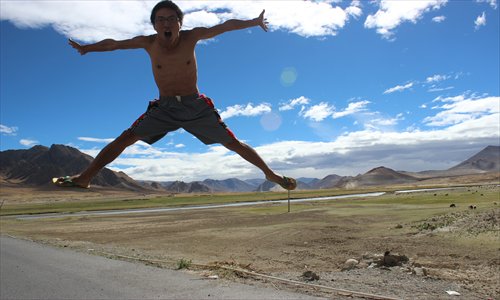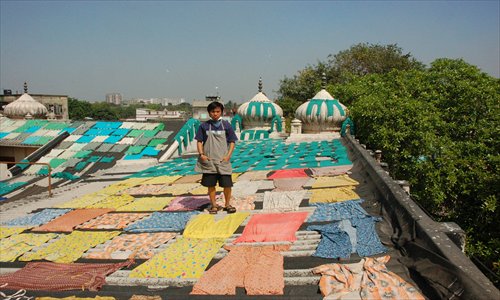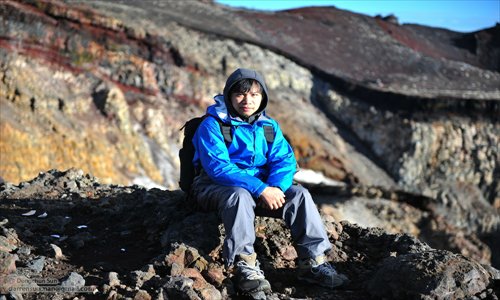HOME >> METRO BEIJING
Vagabond generation
By Jiang Yuxia Source:Global Times Published: 2013-6-26 19:38:01

During his gap year after college, Fan Chang trekked across China and southeast Asia. He visited the Hulunbuir Grasslands of the Inner Mongolia Autonomous Region in July 2012. Photo: Courtesy of Fan Chang
Frustrated when he was turned down from a master's program, Fan Chang decided to take his life on the road for a few months.
With only 500 yuan ($81) in his pocket, the 22-year-old graduate of Jiaxing University in Zhejiang Province hitchhiked to the Huihang Ancient Way in neighboring Anhui Province in May 2012 to begin his journey. The 13-month adventure took him across China and southeast Asia as he earned money doing odd jobs along the way. He faced multiple near-death experiences, one coming on only day two, when he nearly slipped off a 1,800-meter cliff, but was saved when his backpack hooked onto some rocks.
Speaking over the phone from his home province of Hubei, the wanderlust said he was happy to conclude his gap year travels earlier this month.
Settling down and getting a job don't frighten him like they did before.
"I was arrogant and restless ... before I set off on my journey. Now I've become much stronger," Fan said. "I've embraced the responsibilities and the love from my family and friends that I ignored before. I feel ready to return to a normal life with a settled mind."
Fan is part of a growing contingent of young people in China seeking adventure in their early 20s. Instead of taking stable jobs, more are opting for exotic experiences after graduation or a few years after joining the workforce.
The current job market may be contributing to the recent rise of this travel trend. According to the Ministry of Education, the number of college grads hit a new high this year at 7 million, up 190,000 from last year. While there are about 9 million jobs created this year, college grads have to vie for employment against 16 million other job-seekers, according to Beijing-based magazine Caijing. Those who don't want to fight for a spot are looking for an alternative.

Fan Chang jumps in Tingri County in the Tibet Autonomous Region.

Sun Dongchun volunteered at a hospice in Calcutta, India.

Sun lived in and explored Japan after his gap year ended. Photos: Courtesy of Fan Chang and Sun Dongchun
Gap year fever spreadingTaking a gap year is common practice in countries such as the UK, Australia and Israel. Many students kick off their gap years before, during or after higher education. They might spend a year or a few months traveling, volunteering or learning new skills abroad. Rather than a 12-month party, the gap year is meant to be a constructive period of self discovery and improvement.
The gap year concept has became better known in Chinese culture over the past decade, aided by travel texts from amateur writers and photographers such as Sun Dongchun, who penned The Belated Gap Year in 2009.
Sun, now 32, quit his job as a landscape designer in Guangzhou, Guangdong Province, and spent 13 months traveling in southeast Asia and western China in 2006 and 2007 after being inspired by his international friends. The book triggered a very vocal response from readers, many of whom are young Chinese students yearning for adventure while cooped up in schools.
Though the trend is on the rise for Chinese grads, industries have not yet sprouted up around gap years like they have in the West. Many Western gappers plan out their journeys with consulting agencies or experienced gappers. Chinese adventurers, on the other hand, may have to be more entrepreneurial, instead seeking out platforms such as the Gap Year group on Douban, a youth-oriented social networking site.
For domestically-bound gappers, volunteering to teach at schools in the Tibet Autonomous Region or Yunnan Province or engaging in environmental protection in western China can be fascinating options for a year of exploration.
Big adventure, little budget
Acting on impulse without any specific plan, Fan set off last year before he could work to save up more money. He confessed his plan to his parents only a month before departing. They were worried, but he promised to write home.
With his meager 500 yuan, Fan managed to make it from eastern China to Yunnan Province in the southwest, but it wasn't easy. He hitchhiked and slept in tents most of the time. Sometimes he could only cook one meal for two or three days. He lost about 5 kilograms on the arduous voyage.
On the way, he earned small amounts of income by writing travel stories for newspapers, exporting exotic local cosmetics and accessories back to his friends and selling postcards he made from photos he shot. He made sure to send a few of those home to his anxious parents, too.
Fan said the most rewarding part of his time out in the world was seeing how strong he really was, both inside and out.
In Katmandu, Nepal, he witnessed the heavily-guarded speeches given by candidates in the country's month-long election for prime minster. In Calcutta, India, he visited a hospice founded by Mother Teresa and reflected on life while witnessing the struggles of the dying.
"I was seeking fun when I started the trip. But I came to understand the responsibilities I should shoulder, especially for my family, after a year away from home. I was unwilling to work before, but now I really want to make a living for myself," he said.
Back to reality
Fan recorded his 380-day gap year with writing and photos on his Sina Weibo page. Thanks to his almost 3,000 followers and local media coverage, Fan has secured a book deal to document his life-changing experience. When he finishes the book (he estimates it will take three more months), he said he will finally get serious about looking for a job in his home province.
Despite the exciting opportunities now being afforded him, Fan can't help but compare himself to his peers who didn't take a year off since gap years are not yet the norm in China. Fan sounded envious while talking about his classmates' achievements over the past year. Some had started their jobs with a monthly salary of 2,000 yuan, but were now able to make 5,000 yuan. "I have to start everything anew," he acknowledged.
Sun, who regularly receives a large number of requests from young people inquiring about gap years, shares similar views with Fan. As thrilling as his experiences were, he still needed to find a way to get back to a normal life.
After the gap year, Sun was lost and uncertain about his future faced the dilemma of kicking off another vagrant journey or moving to Japan to be with the girlfriend he met during his travels. Harnessing the do-anything spirit of his journey, he took the plunge and moved to Japan, and has since become a freelance writer and photographer.
"A gap year is a process of examining, understanding and finding yourself, and improving your skills to help with your career," he said.
No one-size-fits-all gap year
Sun's book helped launch a whole new segment of travel writing, with fresh titles from new gappers hitting the shelves regularly, including one in March called Gap Year, a Girl on the Road, already a bestseller.
Despite the fact that his own writing career was born from this trend, Sun disagrees with the notion that a year living as a vagabond should be prescribed to everyone.
"Some media reports are unreasonable, saying everyone needs a gap year, which isn't true," said Sun, who is currently writing and traveling in Indonesia. His second book, Life after the Gap Year, will hit shelves, in Chinese only, on July 1.
"Not everyone needs it and it doesn't mean your life isn't complete if you don't go through a gap year," said Sun.
Posted in: Metro Beijing